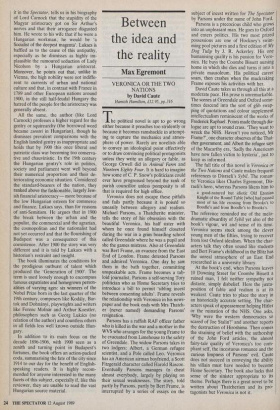Between the idea and the reality
Max Egremont
VERONICA OR THE TWO NATIONS by David Caute Hamish Hamilton, £12.95, pp.316 The political novel is apt to go wrong either because it preaches too stridently or because it becomes ramshackle in attempt- ing to capture the mechanics and atmos- phere of power. Rarely are novelists able to convey an ideological point effectively or to draw convincing political protagonists unless they write an allegory or fable, as George Orwell did in Animal Farm and Nineteen Eighty Four. It is hard to imagine how some of C. P. Snow's politicians could ever have progressed beyond the rank of parish councillor unless pomposity is all that is required for high office.
Veronica does not escape these pitfalls and fails partly because it is poisdd so uneasily between allegory and realism. Michael Parsons, a Thatcherite minister, tells the story of his obsession with the beautiful Veronica, his half sister with whom he once found himself closeted during the war in a grim boarding school called Greendale where he was a pupil and she the games mistress. Also at Greendale was Bert Frame, an evacuee from the East End of London. Frame detested Parsons and admired Veronica. One day he saw them in the bath together, committing unspeakable acts. Frame becomes a tab- loid journalist, Parsons a self-serving Tory politician who as Home Secretary tries to introduce a bill to permit 'sibling incest between consenting adults'. Frame reveals the relationship with Veronica in his news- paper and the book ends with Mrs Thatch- er (never named) demanding Parsons' resignation.
Parsons has a raffish RAF officer father who is killed in the war and a mother in the WVS who arranges for the young Frame to be evacuated from Limehouse to the safety of Greendale. The widow Parsons takes in two lodgers: Albert, a German refugee scientist, and a Pole called Leo. Veronica has an American airman boyfriend, a Scott Fitzgerald character called Harold Rascoe. Eventually Parsons manages fo cheat almost everybody, largely by playing on their sexual weaknesses. The story, told partly by Parsons, partly by Bert Frame, is interrupted by a series of essays on the subject of incest written for The Spectator by Parsons under the name of John Ford.
Parsons is a precocious child who grows into an unpleasant man. He goes to Oxford and enters politics. His two most prized possessions are one of Hockney's swim- ming pool pictures and a first edition of My Dog Tulip by J. R. Ackerley. His one humanising quality is his passion for Vero- nica. He buys the Coombe Bissett nursing home in which she dies and turns it into a private mausoleum. His political career soars, then crashes when the muckraking Frame exposes his activities with her.
David Caute takes us through all this at a moderate pace. His prose is unremarkable. The scenes at Greendale and Oxford some- times descend into the sort of glib swap- ping of quotations and colour supplement intellectualism reminiscent of the works of Frederick Raphael. Points made through dia- logue are apt to sound crass. 'They want to wreck the NHS. Haven't you noticed, Mr Frame?', one character observes of the That- cher government; and Albert the refugee says of the Macarthy era, 'Sadly the Americans have now fallen victim to hysteria', just to keep us informed.
The full title of this novel is Veronica or the Two Nations and Caute makes frequent references to Disraeli's Sybil. The roman- tic Veronica likes Charles Egremont, Dis- raeli's hero, whereas Parsons likens him to
a good-natured but idiotic Old Etonian Knight of the Round Table [who] had passed most of his life crossing from Brooks's to Boodle's and from Boodle's to Brooks's. The reference reminded me of the melo- dramatic absurdity of Sybil yet also of the book's vigour, wit and sense of its time. Veronica seems stuck among the clever young men of the fifties, trying to recover from lost Oxford idealism. When the char- acters talk they often sound like students and Bert Frame's childhood in the Blitz has the unreal atmosphere of an East End researched in a university library.
At the book's end, when Parsons leaves 10 Downing Street for Coombe Bissett a ruined man, I felt neither sympathy nor distaste, simply disbelief. Here the juxta- position of fable and realism is at its weakest. Caute tries to place the story in an historically accurate setting. The char- acters speak of appeasement helping Hitler or the ruination of the NHS. One asks, `Why were the western democracies so scared of Joe Stalin?' and another reports the destruction of Hiroshima. Then comes the straining of belief with the authorship of the John Ford articles, the almost fairy-tale quality of Veronica's too com- pliant self, the incestuous romance and the curious limpness of Parsons' evil. Caute does not succeed in conveying the ability his villain must have needed to become Home Secretary. The book also lacks that sense of the sinister appropriate to its theme. Perhaps there is a great novel to be written about Thatcherism and its pro- tagonists but Veronica is not it.










































 Previous page
Previous page